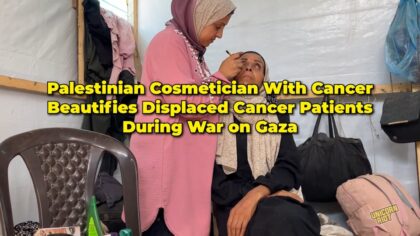Cancer Patients in Gaza Prevented From Life-Saving Treatment by Israeli Border Closures
Single story posts page footer widgets mobile
Al-Helou Hospital is the only hospital that treats cancerous tumors in northern Gaza. Unicorn Riot visited the hospital before Israel conducted their second invasion of Gaza City and bombed Al-Helou. We heard from four patients who had been granted travel referrals but couldn’t travel due to the closure of the crossings.
Without having access to needed medical supplies since Israel began its air, land, and sea siege of Gaza in 2007, healthcare in the Strip has fragmented and slowly deteriorated. Before Israel’s genocidal war on Gaza started in October 2023, there was an estimated 12,500 cancer patients within the Gaza Strip — a number likely much higher with cases often underreported.
Because of the lack of specialized facilities and radiotherapy services, patients are forced to attempt to seek care outside of Gaza, in occupied East Jerusalem or neighboring countries.
However, Israeli occupation forces severely restrict Palestinian people’s movement and residents in Gaza need to get travel referrals to leave the besieged enclave — referrals, that if gotten, are rarely fulfilled because of Israel’s closing of all borders. Before the war on Gaza, 33% of 20,295 permit applications to travel were denied or delayed, increasing the deadly affects of cancer.
Breast cancer is the most common form of cancer and Palestinian women in Gaza and the occupied West Bank have just a 40% five-year survival rate compared to that of 90% in many countries.
Inside Al-Helou Hospital waiting to get her blood drawn, Najah Muhammad Mahdi said that she was cancer free to two years, until the war on Gaza started. “After the war, new cancerous growths appeared.”
“I was fine for two years. But recently after the war, new cancerous growths appeared … I was cured. I was natural. I don’t know, perhaps because of worries and anxieties, new small tumors like chickpeas appeared.” Najah Muhammad Mahdi
Bed-ridden patients Jamal Abu Watfa and Mahmoud Abu Wazna both spoke about the dire need for the war to stop, borders to be opened and for them to be allowed to travel out of Gaza.
Speaking through a tracheoesophageal voice prosthesis, Abu Wazna said “if I were in a place without electricity, I’d die.” Mahmoud has throat cancer and said without treatment, his body is “on fire” and his bones feel like they’re “breaking down.”
“Cancer patients in Gaza have been suffering from the severity of cancer for many months,” said Abu Wazna, “the lack of medical resources and treatments has caused the disease to spread dramatically in our bodies. I have an urgent referral—Form No. 1, the first case. But because the crossings are closed, I can’t leave for treatment.”
Full story and more in links below.
Related posts and coverage:
About this post


